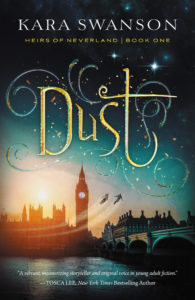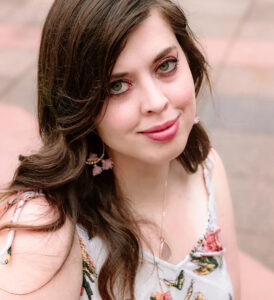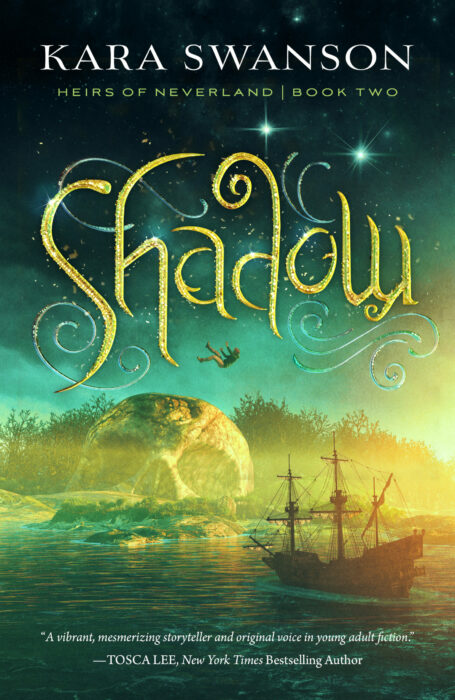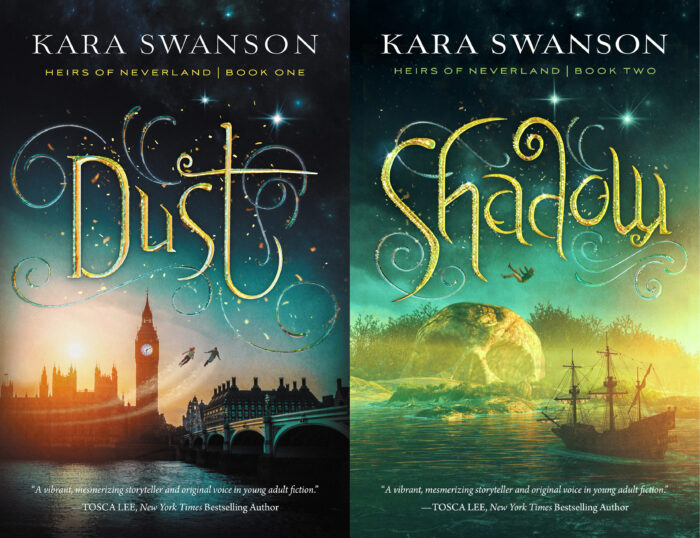78. What If You Discovered Fairy Dust and Peter Pan Were Real? | The Heirs of Neverland series with Kara Swanson
Podcast: Play in new window | Download (Duration: 55:52 — 52.5MB) | Embed
What if you hated the idea of Peter Pan, then learned that your own skin sheds the fairy dust you need for traveling to Neverland? That’s the magical start of Kara Swanson’s Heirs of Neverland series, which began last year with the fantasy novel Dust. That book won three Realm Awards last July, and today Kara Swanson flies into our window and helps guide us to fantastical truth.
Episode sponsors
Learn more at the podcast sponsors page.
 From our Lorehaven review of Dust (fall 2020):
From our Lorehaven review of Dust (fall 2020):
Kara Swanson’s Dust shares the magical story of Claire, a girl who hates Peter Pan but who may be the key to saving Neverland. Because of Peter Pan, Claire’s brother is missing. In London, she meets a boy who helps her discover truths about herself and the strange and powerful dust that sheds from her skin. Her dust may not be the curse she always thought—it may be exactly what she needs to find her brother. She must evade pirates and rogue lost boys and learn whom to trust. Nothing is as it seems, and wishing on stars will get her nowhere in this delightfully twisted sequel to a classic.
 Introducing novelist Kara Swanson
Introducing novelist Kara Swanson
As the daughter of missionaries, Kara Swanson spent her childhood running barefoot through the lush jungles of Papua New Guinea. Able to relate with characters dropped into a unique new world, she quickly fell in love with the fantasy genre.
Swanson is the award-winning author of The Girl Who Could See and Peter Pan retelling/sequels Dust and Shadow (from Enclave Publishing).
Kara is passionate about crafting stories of light shattering darkness, connecting with readers, and becoming best friends with a mermaid—though not necessarily in that order.
1. What happy thoughts lifted you to biblical faith and fantastic imagination?
 2. Which pirate maps led to your stories, including your version of Neverland?
2. Which pirate maps led to your stories, including your version of Neverland?
3. Where will you fly next in your creative journeys?
Follow Kara Swanson to Neverland and beyond
- KaraSwanson.com
- @KSwansonAuthor on Twitter
- Kara Swanson, author on Facebook
- @KaraSwansonAuthor on Instagram
Com station
Commentator “notleia” returns, regarding episode 77:
Welp, isn’t this all as clear as mud. For as much as this might be intended to serve as a Article Zero or Article Point Five, it still feels a bit reductionist. To use the hats metaphor, we all know that we all wear many different hats, but I don’t feel the need to put a hierarchy on the hats, but ask what each hat might bring to the discussion. But I am admittedly a follower of the postmodernist school of reading where it’s all thrown in the pot and stirred until something falls out (and then you argue about what that thing is and what it means).
Also I might argue that stories are not necessarily a deep-seated want in of themselves, that we have a deep-seated want for meaning, and we largely achieve that by means of the stories we tell ourselves.
But also, mostly unrelated, there’s a lot to unpack in these little side bits about people trying to gain authority by the Teacher, or the Evangelist or the Author, and how that relates to an authoritarian culture, but that’s my psychological/sociological nerd hat talking.
Also also: is “deconstruction” becoming a new negative buzz word, like “canceling”? Why? Admittedly I’m biased because I love deconstruction.
Next on Fantastical Truth
This month marks the twentieth-year anniversary of the Sept. 11 terrorist attacks in the United States. Maybe you dimly recall these terrible events, but Zack and Stephen remember them quite well. We also recall the stories and other images we used while trying to understand how people could do this. We will explore not just Sept. 11, and similar events today, but the greater question of how we use fantastic fiction to process real wars and rumors of wars.































LOL, do I get an official “Frenemy of the Site” shirt?
YES, DECONSTRUCT EVERYTHING (ESPECIALLY THE SOUTHERN BAPTISTS)
But for me, it’s more about uncovering our hidden blind spots and playing around with concepts than about proving dweebs like Plato wrong (that’s just a side benefit).
(PS “Authoritarianism” is more specific than the concept of authority and all the assorted structures that authority organizes itself in. I’ll spare you an essay on it and provide a linky for some free reading: https://web.archive.org/web/20200916190422/http://www.theauthoritarians.org/options-for-getting-the-book/)
Better linky: https://drive.google.com/file/d/0BxxylK6fR81rckQxWi1hVFFRUDg/view?resourcekey=0-WGxUhtR8lhJdnFck4tTIyA
About authoritarianism, this recent article from The Atlantic should be noted. Basically, the prevailing wisdom for too long has wrongly been that authoritarianism only exists on the Right. As they show in the research referenced in this article, it’s just as much of a problem on the Left. It simply doesn’t get considered, and they discuss the reasons why here:
https://www.theatlantic.com/ideas/archive/2021/09/psychological-dimensions-left-wing-authoritarianism/620185/
Bob did have a pretty short note about there being such a thing as left-wing authoritarian followers, but that they are a much rarer beast. Even this linky doesn’t seem to argue that LWA are as prevalent as RWA. I find it interesting that there’s even differences between LWA and RWA despite their underlying psychology being the same — that LWA are more open to differences (and whether/how that might relate to the OCEAN personality test). Or maybe it’s a matter of threshold. But I think — don’t remember if it’s been documented — that LW spaces don’t reward LWA-ism in the same way that RW spaces reward RWA-ism. Or maybe, again, it’s a matter of threshold.
But in any case, it is good to question whether you have blind spots.
When I was in first grade, I used to be obsessed with the Peter Pan story. Mainly the Broadway play I saw on tv. I never read the book, but a few aspects of the Peter Pan story spoke to me, especially since it interfaced with the way I was contemplating the notion of death at the time. I was a Christian even then, but the physical aspect of death still scared me.
Since Peter Pan never grew old, he would be able to live forever so long as he didn’t get killed by Captain Hook or something. So he had risk and hardship and adventure, but still that chance to live on and on in a place that was important to him. There were elements of that that I wanted and wished for, even if I could never have them to that extent(at least on earth). So Peter Pan brought some of these things out of me where I could notice and work through them. I’m at a different stage now, when it comes to thinking about death, and Peter Pan is no longer my favorite story. But it was an important step along my path and an important part in my development.
Kind of glad to hear the original Peter Pan book was darker and different than the movies, so I might have to read it (and Kara Swanson’s Dust) some time in the future 🙂